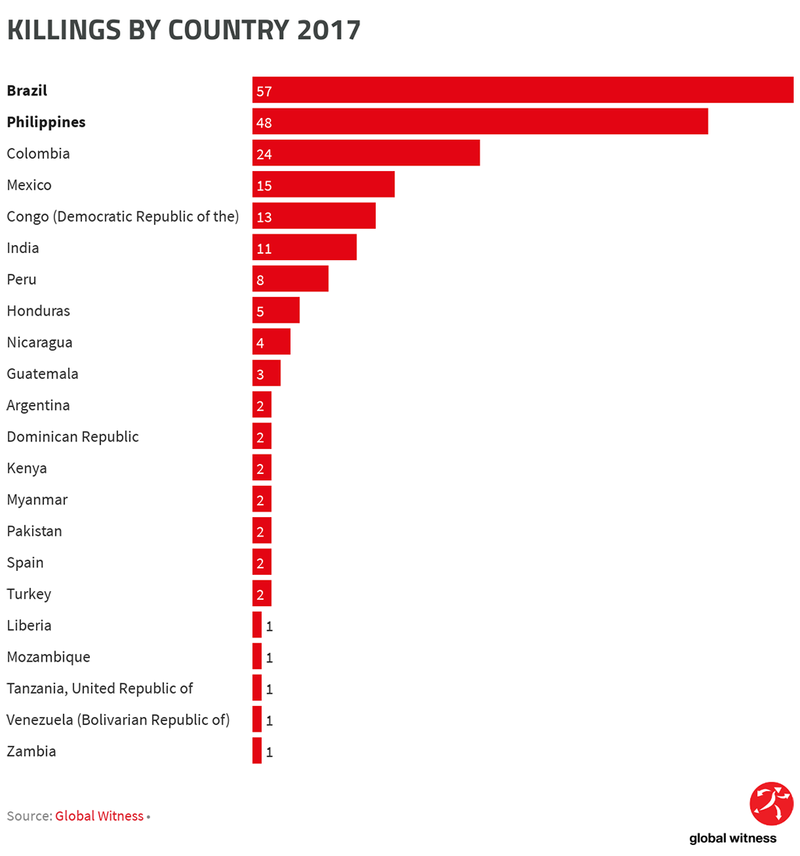The assassins came for Colombian land-rights activist Hernán Bedoya on Dec. 5, 2017, shooting him 14 times and killing him instantly.
Bedoya, who had been defending his community against palm-oil and other industrial agriculture, was just one of a record number of environmentalists and eco-defenders who were murdered last year, according to data released today by Global Witness.
All told at least 207 men and women around the globe lost their lives in 2017 — four per week — as they tried to defend their homes and communities against mining, agriculture, wildlife trafficking and other legal and illegal activities.
The actual number of slain activists is probably much higher, as many of these killings take part in remote parts of the world and crimes are often covered up by government officials or corporations. Global Witness originally announced that 197 people had been killed in 2017, but the organization has since uncovered the details of an additional 10 murders.
More than half the killings occurred in just two countries: Brazil, with 57 deaths, and the Philippines, with 48 — the latter being the highest number of deaths Global Witness has ever documented in an Asian country. Around the world at least 46 murders were linked to agribusiness, with 40 linked to the mining sector. A record 23 people, mostly rangers in Africa, were murdered by poachers and wildlife traffickers.
 Intimidation
Intimidation
The murders themselves are just one prong of attack against activists. Hundreds of additional people each year are also intimidated or silenced by violence, sexual assaults, arrests, death threats, cyber-attacks or lawsuits.
In one of the most brutal encounters cited by Global Witness, 22 indigenous activists in Brazil were attacked by ranchers who have claimed their land. Two of the assaulted men had their hands cut off with machetes.
Other cases are less bloody but destructive in their own ways. For example, last year a South African subsidiary of an Australian company filed defamation suits against two with the Centre for Environmental Rights and a local activist who had publicly criticized a sand-mineral mining operation.
This is a fairly common strategy to shut down public discourse, says Bern Johnson, executive director of Environmental Law Alliance Worldwide (ELAW), which partners with the South African attorneys. “Strategic lawsuits against public participation (SLAPPs) are intended to intimidate and silence project opponents by burdening them with the expenses and burdens of mounting a legal defense,” he says. “Another ELAW partner, Eduardo Mosqueda Sánchez of Guadalajara, Mexico, was jailed for ten months on bogus charges while defending the land rights of the indigenous Nahua peoples.”
Some Solutions
What can be done to stop these assaults? Governments, companies and investors “can prevent these threats from emerging in the first place by listening to local communities, respecting their rights, and ensuring that business is conducted responsibly,” Global Witness senior campaigner Ben Leather said in a press release.
Other groups can also help. “International civil society organizations and stakeholders can act to prevent attacks, defend advocates and hold government and corporate perpetrators responsible for attacks on environmental defenders,” says ELAW’s Johnson. He points to important organizations such as the Defending Defenders Coalition, under which ELAW and other NGOs are forming a joint advocacy strategy, and international and regional human-rights mechanisms such as the Inter-American Commission on Human Rights and the United Nations Special Rapporteur on Human Rights Defenders, which protect environmental defenders and advocates.
Protecting these people, however, is not always easy. “Because each environmental advocate works in a unique situation, threats against them must be handled on a case-by-case basis,” says Johnson. “What helps in one case might do harm in another.” He says ELAW coordinates with local partners to help people “reduce their risks and make themselves less attractive targets.” He points to Security Planner by the Citizen Lab and Security in a Box by Tactical Technology Collective and Front Line Defenders as helpful resources for protecting activists and their data from digital attacks.
Global Witness, meanwhile, says individuals can help by holding governments and corporations responsible for their actions, especially by choosing not to do business with offending companies.
The Cycle Continues
What will the picture of intimidated and murdered activists look like for 2018? As of this writing, nearly 60 activists and defenders are known to have been murdered this year. Most recently, a park ranger was killed by rhino poachers in South Africa’s Kruger National Park on July 19.
And as happens far too often in cases like this, no arrests have yet been made for the crime.


